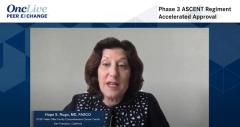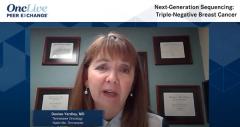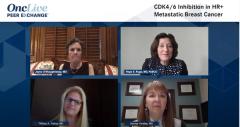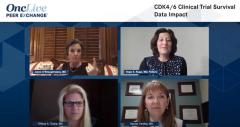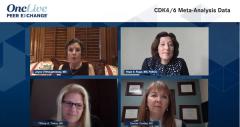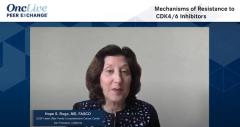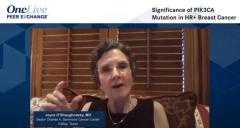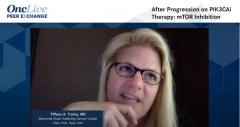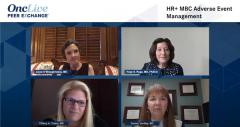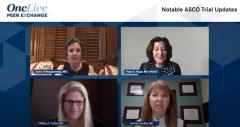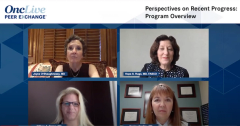
CDK4/6 Meta-Analysis Data
Episodes in this series

Joyce O’Shaughnessy, MD: Tiffany, I have a similar question with the overall survival data: how do they impact differences between the CDKs [cyclin-dependent kinase inhibitors] that may lead you to think about different ones for different patients? I think there’s been a recent FDA meta-analysis of all of the data. Maybe you could update us on that?
Tiffany A. Traina, MD: Yes, I’m happy to chat about that. I do share a lot of Hope’s approach in what she’s described in choice of endocrine partner as well as some of the differentiating factors around the CDK4/6 inhibitors. I think that from a benefit standpoint, we're seeing that the incorporation of CDK4/6 inhibition in a patient's treatment course, and certainly in the first-line setting, is advantageous.
The meta-analysis that you alluded to was a pooled analysis of CDK4/6 inhibitor data from the FDA that was published in early 2020. This looked at phase 3 studies of endocrine therapy and CDK4/6 inhibitors. They looked at 7 trials. There were more than 4000 patients in this analysis. They had almost 2 years of follow-up in that study, and across the board there was a significant advantage to CDK4/6 inhibition in terms of progression-free survival. The median absolute difference was almost 9 months, favoring adding a CDK4/6 inhibitor.
I think that we have all in multiple discussions been asked, is there a patient for whom you shouldn't use the CDK4/6 inhibitor? This pooled analysis showed that across all subsets that you could envision and imagine, the addition of a CDK4/6 inhibitor was preferred. They looked at line of therapy, they looked at partner endocrine therapy, AI [aromatase inhibitor] versus fulvestrant, and really across the board the advantage is there for the CDK4/6 inhibitor. That pooled analysis is looking at CDK4/6 inhibitors as a class and showing that it is better for your patient to have one than to not have one.
Oftentimes in practice I find choices based on toxicity. For abemaciclib I see a bit more in the way of gastrointestinal [GI] toxicity, so if somebody has some underlying inflammatory bowel, irritable bowel GI sensitivities, perhaps I would avoid that in preference of one of the others. We do know that abemaciclib tends to be a little bit easier in terms of myelosuppression, so sometimes for patients who have had difficulty with their blood cell counts previously, I'm more inclined perhaps to try abemaciclib for them.
We know that there are some monitoring differences between the 3 CDK4/6 inhibitors, perhaps attention needs to be paid to QTc goocorrected QT interval] prolongation, electrocardiography monitoring, and drug-to-drug interaction around ribociclib. Some of these logistical differences weigh in to patient preference and choice of CDK4/6 inhibitor, as well. I think that consistently, the data are showing us that the addition of a CDK4/6 inhibitor to endocrine therapy is of benefit for our patient.
Joyce O’Shaughnessy, MD: Yes, thank you. The data are getting stronger; we await the first-line data and the additional adjuvant data. Unfortunately, we did get the news during ASCO [the American Society of Clinical Oncology annual meeting] that the adjuvant palbociclib trial is not going to be able to meet its primary end point. We’ll have to wait to see the data to see what the considerations would be in that. However, we’re still waiting on palbociclib adjuvant data, the PENELOPE trial, in a very high-risk population with residual disease, and we’re waiting on the MONARCH 3 data in a high-risk population with abemaciclib. The NATALEE trial with ribociclib is still enrolling. We have a lot more to learn about patient populations who may benefit in the adjuvant setting.
Hope S. Rugo, MD, FASCO: Although, you know Joyce, one thing about that survival data is so interesting to me because, other than the MONALEESA trial that combined first and second line in a higher-risk population, we haven't seen the survival data yet from the solely first-line trials. So more than 12 months from an AI, and this suggests to me that people live a long time, which is good.
If you take a bunch of patients that include 1000 with stage IIa disease and you say you need an end point by 3 years, maybe our expectations are all wrong. Maybe what we're really looking for is what's going to happen at 8 or 10 years.
Joyce O’Shaughnessy, MD: I agree totally. If you look at the history of our adjuvant trials, that's exactly right. People are doing too well, thank goodness; they're not recurring in 5 years. Most of the end points are 3 and 5 years. Absolutely, we'll wait and see, but that's the most likely scenario just based on our history, which of course is a good problem to have.
Transcript edited for clarity.


